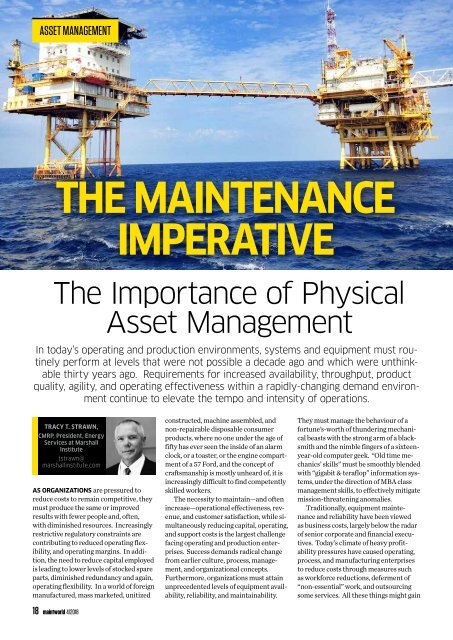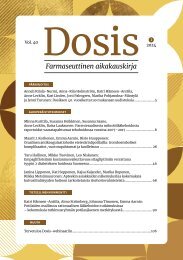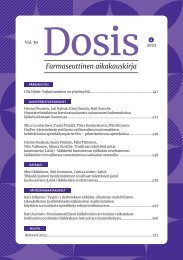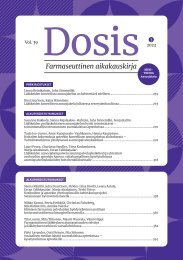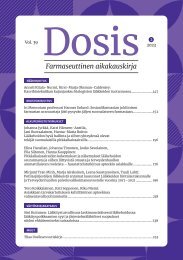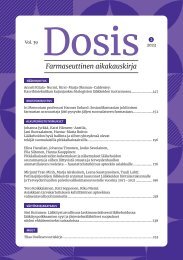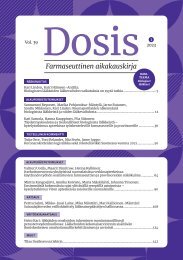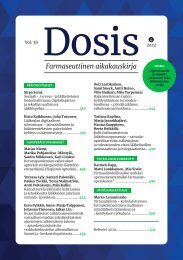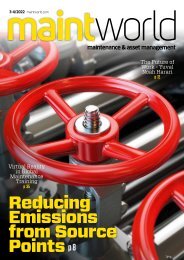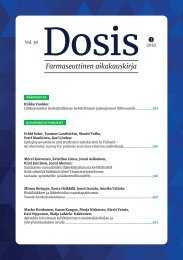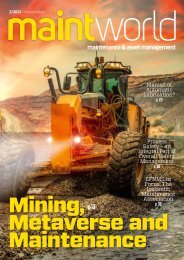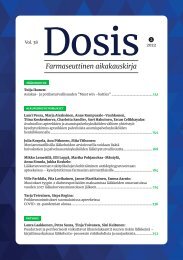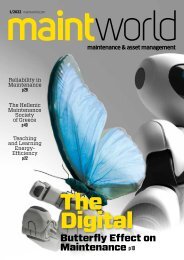Maintworld 4/2018
The Maintenance Imperative // Energy savings // Safety Hazards in the Food Processing Industry
The Maintenance Imperative // Energy savings // Safety Hazards in the Food Processing Industry
Create successful ePaper yourself
Turn your PDF publications into a flip-book with our unique Google optimized e-Paper software.
ASSET MANAGEMENT<br />
THE MAINTENANCE<br />
IMPERATIVE<br />
The Importance of Physical<br />
Asset Management<br />
In today’s operating and production environments, systems and equipment must routinely<br />
perform at levels that were not possible a decade ago and which were unthinkable<br />
thirty years ago. Requirements for increased availability, throughput, product<br />
quality, agility, and operating effectiveness within a rapidly-changing demand environment<br />
continue to elevate the tempo and intensity of operations.<br />
TRACY T. STRAWN,<br />
CMRP, President, Energy<br />
Services at Marshall<br />
Institute<br />
tstrawn@<br />
marshallinstitute.com<br />
AS ORGANIZATIONS are pressured to<br />
reduce costs to remain competitive, they<br />
must produce the same or improved<br />
results with fewer people and, often,<br />
with diminished resources. Increasingly<br />
restrictive regulatory constraints are<br />
contributing to reduced operating flexibility,<br />
and operating margins. In addition,<br />
the need to reduce capital employed<br />
is leading to lower levels of stocked spare<br />
parts, diminished redundancy and again,<br />
operating flexibility. In a world of foreign<br />
manufactured, mass marketed, unitized<br />
18 maintworld 4/<strong>2018</strong><br />
constructed, machine assembled, and<br />
non-repairable disposable consumer<br />
products, where no one under the age of<br />
fifty has ever seen the inside of an alarm<br />
clock, or a toaster, or the engine compartment<br />
of a 57 Ford, and the concept of<br />
craftsmanship is mostly unheard of, it is<br />
increasingly difficult to find competently<br />
skilled workers.<br />
The necessity to maintain—and often<br />
increase—operational effectiveness, revenue,<br />
and customer satisfaction, while simultaneously<br />
reducing capital, operating,<br />
and support costs is the largest challenge<br />
facing operating and production enterprises.<br />
Success demands radical change<br />
from earlier culture, process, management,<br />
and organizational concepts.<br />
Furthermore, organizations must attain<br />
unprecedented levels of equipment availability,<br />
reliability, and maintainability.<br />
They must manage the behaviour of a<br />
fortune’s-worth of thundering mechanical<br />
beasts with the strong arm of a blacksmith<br />
and the nimble fingers of a sixteenyear-old<br />
computer geek. “Old time mechanics’<br />
skills” must be smoothly blended<br />
with “gigabit & teraflop” information systems,<br />
under the direction of MBA class<br />
management skills, to effectively mitigate<br />
mission-threatening anomalies.<br />
Traditionally, equipment maintenance<br />
and reliability have been viewed<br />
as business costs, largely below the radar<br />
of senior corporate and financial executives.<br />
Today’s climate of heavy profitability<br />
pressures have caused operating,<br />
process, and manufacturing enterprises<br />
to reduce costs through measures such<br />
as workforce reductions, deferment of<br />
“non-essential” work, and outsourcing<br />
some services. All these things might gain


